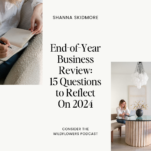Keep Reading
End of Year Business Review: 15 Questions to Ask Before the Year Ends
APPLE PODCASTS | SPOTIFY As the year winds down, it’s easy to get caught up in the holiday rush and forget to take a moment to reflect. But the end of the year is the perfect opportunity to pause, look back, and assess how far you’ve come. In Part One of this special two-part series, […]

Paragraph
APPLE PODCASTS | SPOTIFY
As the year winds down, it’s easy to get caught up in the holiday rush and forget to take a moment to reflect. But the end of the year is the perfect opportunity to pause, look back, and assess how far you’ve come. In Part One of this special two-part series, I’m diving deep into my process for conducting a thorough end-of-year business review—a critical step in setting yourself up for success in the new year.
If you’ve ever set goals that fell by the wayside or felt overwhelmed by the idea of planning for the year ahead, this episode is for you. I’ll guide you through the exact steps I use to reflect on the past 12 months—personally, professionally, and financially—to gain clarity and insight for what’s next. The process is all about looking back at your wins and challenges, assessing what worked and what didn’t, and gathering valuable lessons that will inform your goals for the upcoming year.
From reviewing your finances and personal milestones to assessing what strategies drove results in your business, I’ll walk you through 15 key questions that will help you evaluate your year. These questions cover everything from your biggest wins to areas of improvement and even your emotional and physical well-being. By the end of this episode, you’ll have a clear roadmap for reflecting on the past year, and you’ll be ready to head into Part Two with a solid foundation for intentional goal-setting.
This isn’t just about reviewing goals—it’s about creating a space to truly assess where you’ve been, so you can thoughtfully plan where you’re headed. Grab your journal, your favorite pen, and get ready to dig into a powerful end-of-year business review process that will leave you feeling refreshed and focused for the year ahead!
Step One: Make Time for Intentional Reflection
Before diving into the review, you’ll want to make sure you’ve carved out some quiet time for yourself. Life gets busy, especially during the holiday season, but finding even an hour of uninterrupted time is essential. Grab your journal, a cup of coffee, and settle into a space where you can truly reflect. Whether it’s a cozy corner of your home or your favorite local coffee shop, the point is to create space for your brain to think, dream and plan. This time is not about rushing through tasks—it’s about slowing down to be present and intentional with your thoughts.
Step Two: Here’s What You’ll Need
You’ll need a few tools to make the most out of your end-of-year business review. Start by gathering your business bookkeeping records so you can accurately assess your finances for the year. I recommend looking over your sales, expenses, profits, and the money you paid yourself—this will give you a clear picture of how your business performed and help inform your planning for the next year.
You’ll also want to pull out any spreadsheets you’ve used throughout the year, like your monthly business budget tracker or your business stats tracker. These spreadsheets will give you data points to help identify trends, successes, and areas that need improvement. You don’t need to use my exact spreadsheets, but having some kind of detailed financial tracker is key.
For personal reflection, make sure you have a journal handy. There’s real power in writing down your thoughts—it forces you to slow down and think deeply. If you prefer a more structured guide, I recommend using a planner like My Blueprint Year. It’s a tool I created to organize reflection and goal-setting, and it’s been a game changer for me.
Lastly, take a look back at last year’s goals, vision boards, and any letters you’ve written to yourself. Reflecting on what you wanted to achieve can help you recognize what worked, what didn’t, and what you want to carry forward into the new year.
Step Three: 15 Key Questions to Ask Before the Year Ends
Now that you’ve set the stage with your tools, it’s time to dive into the real work: reflection. I recommend asking yourself 15 key questions that will help you evaluate the year from multiple angles: personally, professionally, and financially. These questions will guide you in identifying wins, challenges, and areas for growth. Here are some of the key questions to consider:
- What were your biggest wins this year, personally, professionally and financially?
- What were the highs and lows of the year?
- How are you… really?
- What goals did you set last year, and did you follow through on them?
- What worked?
- What didn’t?
- Lessons learned.
- What are you most proud of, and why?
- What was the best investment you made this year, and why?
- What’s one thing you want to carry into next year?
- and what’s one thing you want to leave behind?
- What are you most grateful for this past year?
- What are you saying ‘no’ to in this season for the sake of balance?
- What are you most excited about for the upcoming year?
- How can you make next year even better than this year?
Answering these questions will help you dig deep and uncover the insights you need to plan for next year. It’s all about being honest with yourself and looking at both the successes and opportunities for improvement.
Step Four: By the Numbers (Financial & Marketing Metrics to review)
Once you’ve processed your feelings and insights, it’s time to turn to the numbers. I know, I know—numbers can feel intimidating, but trust me, they’re a critical part of this process. Looking at your financial metrics helps you understand where your business really stands and where you need to make adjustments.
Start with your sales for the year—what trends can you spot? Were there months when your revenue spiked or dipped? Did any particular product or service perform better than expected? Then move on to your expenses—are there areas where you overspent or were surprised by costs? From there, calculate your profit and ask yourself if it’s where you’d like it to be. You should aim for a healthy profit margin (around 30% of total sales), but this will vary depending on your business type.
Don’t forget to assess owner’s pay—how much are you paying yourself? This number is crucial to understanding your pricing structure and whether you need to adjust your business model. Finally, if you haven’t already, track your working wage—how many hours did you work this year, and what was your hourly rate? This exercise is especially valuable for business owners who juggle multiple roles, as it helps you understand where your time is going and whether it’s being spent wisely.
On top of your financial data, it’s essential to review your marketing metrics. Take a look at your website traffic, email subscribers, podcast downloads, and social media performance. These numbers will help you understand what marketing efforts worked best, what didn’t, and where you should put your focus in the new year.
_
Once you’ve reflected on both the emotional and numerical aspects of the year, you’re ready to start planning for next year. The goal of this end-of-year business review is not only to understand where you’ve been but to set a clear direction for where you want to go. By taking the time to assess the past year, you’ll walk into the new year with a sense of clarity and focus that will make your planning more intentional and grounded.
This episode is just the beginning! Tune in to Part Two of the series, where I dive into my unique approach to goal-setting—hint: it’s not about traditional goal-setting at all. I’m sharing three powerful steps to help you set goals that you’ll actually achieve in the new year!
📌 RESOURCES MENTIONED:
My Blueprint Year: Goal Setting Course & Planner!
Creative Money Spreadsheet Template Shop
One Year Business Budget Spreadsheet
Monthly Business Budget Tracking Spreadsheet
One Year Personal Home Budget Spreadsheet
Monthly Personal Home Budget Tracking Spreadsheet
Business Stats Tracking Spreadsheet
How I track my time in Toggl video
SHARE THIS:
December 19, 2024
Previous Post:
Next Post:



And if you found this helpful, share with your friends!